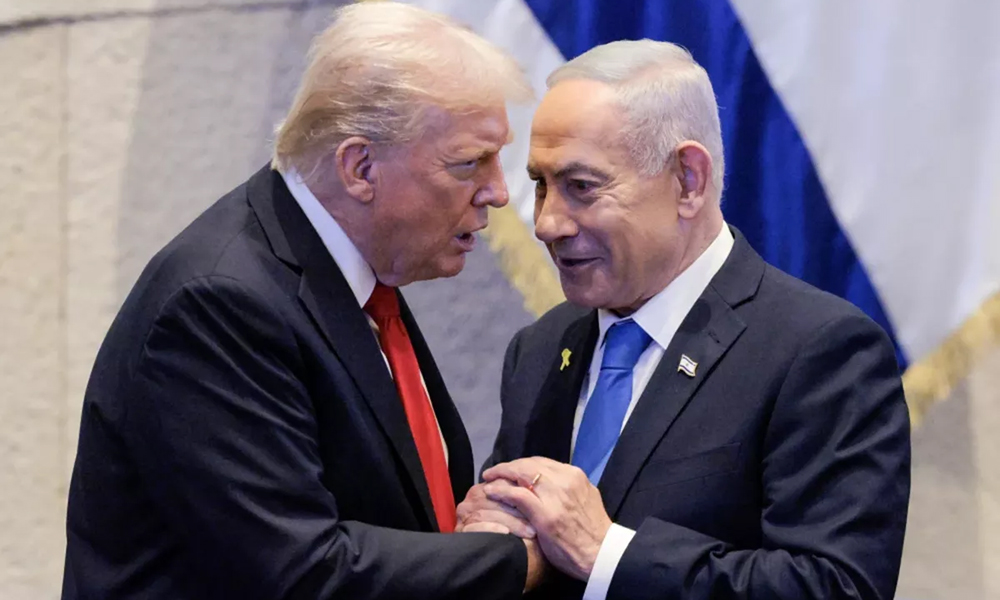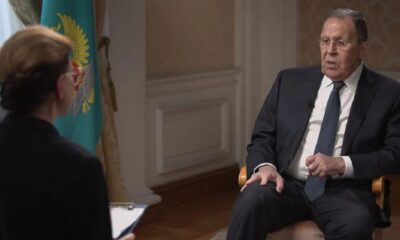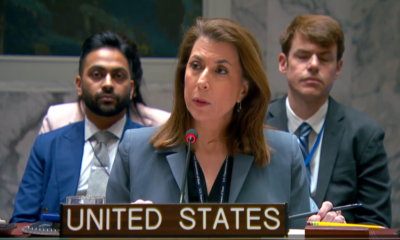World
Kazakhstan government’s resignation fails to quell protests

Protesters stormed public buildings in Kazakhstan‘s biggest city on Wednesday as security forces struggled to impose control after the government resigned in response to popular anger over a fuel price increase.
An Instagram live stream by a Kazakh blogger showed a fire blazing in the mayor’s office in the city of Almaty, with gunshots audible nearby. Videos posted online also showed the nearby prosecutor’s office burning.
Protesters appeared to have broken through security forces’ cordons even though the latter deployed stun grenades whose explosions could be heard throughout the city center.
Kazakhstan is a tightly controlled former Soviet republic that cultivates an image of political stability, helping it attract hundreds of billions of dollars of foreign investment in its oil and metals industries.
President Kassym-Jomart Tokayev accepted the government’s resignation on Wednesday, a day after police used tear gas and stun grenades to drive hundreds of protesters out of the main square in Almaty.
On Wednesday a Reuters correspondent saw thousands of protesters pressing ahead towards Almaty city center, some of them on a large truck, after security forces failed to disperse them with tear gas and flashbang grenades.
Atameken, Kazakhstan‘s business lobby group, said its members were reporting cases of attacks on banks, stores, and restaurants.
The city health department said 190 people had sought medical help, including 137 police. City authorities urged residents to stay home.
The interior ministry said that government buildings were also attacked in the southern cities of Shymkent and Taraz overnight, with 95 police wounded in clashes. Police have detained more than 200 people.
A video posted online showed police using a water cannon and stun grenades against protesters in front of the mayor’s office in Aktobe, the capital of another western province
The protests began after the government lifted price controls on liquefied petroleum gas at the start of the year. Many Kazakhs have converted their cars to run on LPG because of its low cost.
The government said the regulated price was causing losses for producers and needed to be liberalized. The president said it had botched the move.
Speaking to acting cabinet members, Tokayev ordered them and provincial governors to reinstate price controls on LPG, and broaden them to gasoline, diesel, and other “socially important” consumer goods.
He also ordered the government to develop a personal bankruptcy law and consider freezing utility prices and subsidizing rent payments for poor families.
He said the situation was improving in protest-hit cities and towns, including Almaty and the surrounding province, where the authorities declared a state of emergency.
In addition to replacing the prime minister, Tokayev also appointed a new first deputy head of the National Security Committee who replaced Samat Abish, a nephew of powerful ex-president Nursultan Nazarbayev.
Nazarbayev, 81, a Soviet-era Communist Party boss, ran Kazakhstan for almost 30 years before resigning abruptly in 2019 and backing Tokayev as successor. Nazarbayev retains sweeping powers as the chairman of the security council; he has not convened the council or commented on this week’s violence.
The protests began in the oil-producing western province of Mangistau on Sunday, after LPG prices more than doubled following the lifting of caps.
A source familiar with the situation said some workers at Mangistaumunaigas, a Kazakh-Chinese oil-producing joint venture based in the Mangistau province, were on strike, although this was not affecting output so far.
Tokayev declared the emergency in Almaty and Mangistau and has said that domestic and foreign provocateurs were behind the violence.
Almaty mayor Bakytzhan Sagintayev said the situation in the city was under control and security forces were detaining “provocateurs and extremists”.
Kazakhstan‘s dollar-denominated sovereign bonds suffered sharp falls with the 2045 issue falling around 3 cents in the dollar and many dropping to levels last seen in 2020, Tradeweb data showed.
Like many emerging and developing economies, Kazakhstan has grappled with rising price pressures in recent years. Inflation was closing in on 9% year-on-year late last year – its highest level in more than five years – forcing the central bank to raise interest rates to 9.75%.
Some analysts said the protests – the most serious in the country in at least a decade – pointed to more deep-rooted issues.
“I think there is an underlying undercurrent of frustrations in Kazakhstan over the lack of democracy,” said Tim Ash, emerging market strategist at BlueBay Asset Management.
“Young, internet-savvy Kazakhs, especially in Almaty, likely want similar freedoms as Ukrainians, Georgians, Moldovans, Kyrgyz, and Armenians, who have also vented their frustrations over the years with authoritarian regimes.”
World
Second US aircraft carrier to head to Middle East amid Iran tensions, US media reports

The U.S. is sending a second aircraft carrier to the Middle East amid tensions with Iran, U.S. media outlets reported late on Thursday.
The aircraft carrier USS Gerald R. Ford and its escort ships will be sent to the Middle East from the Caribbean, the New York Times, which first reported the news, said, citing U.S. officials, according to Reuters.
The White House and the Pentagon did not immediately respond to a Reuters request for comment outside of regular business hours.
Earlier this week, President Donald Trump had said he was considering sending a second aircraft carrier to the Middle East if a deal is not reached with Iran.
The first aircraft carrier, the USS Abraham Lincoln and several guided-missile destroyers arrived in the Middle East in January.
Trump said on Thursday the United States has to make a deal with Iran and suggested an agreement could be struck over the next month.
“We have to make a deal, otherwise it’s going to be very traumatic, very traumatic,” Trump told reporters.
Israeli Prime Minister Benjamin Netanyahu on Thursday said he hoped that Trump was creating the conditions to reach a deal with Iran that would avoid military action.
World
Pressure rises on Dubai port giant DP World over chief’s alleged Epstein ties

The UK development finance agency and Canada’s second-largest pension fund have suspended new investment with global ports operator DP World over alleged ties between its chief executive and the late disgraced financier Jeffrey Epstein, raising pressure on the Dubai-based firm.
Members of the U.S. Congress said DP World Chairman and CEO Sultan Ahmed bin Sulayem’s name appeared in the files, prompting renewed scrutiny of his past interactions with Epstein, a convicted sex offender, Reuters reported.
The documents, some of millions published by the U.S. Department of Justice and showing Epstein’s web of relationships with prominent people in politics, finance, academia and business, suggest a close relationship between the two men for more than a decade after Epstein’s conviction in 2008 on prostitution charges involving an underage girl.
The documents include emails and text messages that appear to show discussions between the two men about business, conversations about sex and plans to visit Epstein’s Caribbean island.
Being named in the files is not evidence of criminal activity.
DP World declined to comment, while Bin Sulayem did not immediately respond to a request for comment sent to his LinkedIn account.
The UK development finance agency, British International Investment, said that it had paused new investments with DP World.
“We are shocked by the allegations emerging in the Epstein files regarding Sultan Ahmed bin Sulayem,” said a spokesperson for BII, which invests alongside DP World in four ports in Africa.
“In light of the allegations, we will not be making any new investments with DP World until the required actions have been taken by the company.”
Canadian pension fund La Caisse said in a statement it was “pausing additional capital deployment alongside the company” until DP World clarified the situation and took “the necessary actions”.
PROMINENT ROLE
Bin Sulayem, one of Dubai’s most influential businessmen, has led DP World through an expansion that has seen the company turn into one of the world’s largest logistics companies.
It says it handles around 10% of global trade, with operations spanning across the globe, including in Canada, Peru, India and Angola.
DP World also sponsors a leading professional golf tour in Europe and has been a logistics partner for McLaren’s Formula 1 racing team since 2023. Its logo can be seen on cricket players in South Africa and football players in Australia.
McLaren declined to comment on whether it was revisiting its relationship with the Emirati company.
Besides his role at DP World, Sulayem is listed as chairman of the Dubai International Chamber and the Dubai Ports, Customs and Free Zone Corporation, among others.
Some of Bin Sulayem’s other ventures include establishing Nakheel, the real estate developer behind Dubai’s famous palm-shaped islands, as well as contributing to the creation of commodities exchange DMCC, according to a bio on DP World’s website.
World
Israel’s Netanyahu expected to press Trump over Iran diplomacy
Iran says its nuclear activities are for peaceful purposes, while the U.S. and Israel have accused it of past efforts to develop nuclear weapons.

President Donald Trump will host Benjamin Netanyahu at the White House on Wednesday where the Israeli prime minister is expected to press him to widen U.S. talks with Iran to include curbs on Tehran’s missile arsenal and other security threats that go beyond its nuclear program, Reuters reported.
In his seventh meeting with Trump since the president returned to office nearly 13 months ago, Netanyahu will be looking to influence the next round of U.S. discussions with Iran following nuclear negotiations held in Oman last Friday amid heightened Middle East tensions.
Trump has threatened to carry out strikes on Iran if an agreement is not reached, and Tehran has responded with vows to retaliate, fueling fears of a wider regional war. He has repeatedly voiced support for a secure Israel, long a close U.S. ally in the Middle East and an arch-foe of Iran.
The president repeated his warning in a series of media interviews on Tuesday, saying while he believes Iran wants to make a deal, he would do “something very tough” if they refused. He told Axios he was considering sending a second aircraft carrier strike group as part of a massive buildup of U.S. forces near Iran, read the report.
Israel is concerned that the U.S. might pursue a narrow nuclear deal that does not include limitations on Iran’s ballistic missile program or an end to Iranian support for armed proxy groups such as Hamas and Hezbollah, according to people familiar with the matter.
“I will present to the president our perceptions of the principles in the negotiations,” Netanyahu told reporters before departing for the U.S.
The two men could also discuss potential military action in the event that U.S.-Iran diplomacy fails, according to one of the sources.
After arriving in Washington on Tuesday night, Netanyahu met U.S. special envoy Steve Witkoff and Trump’s son-in-law Jared Kushner, who led the U.S. team at the Iran talks, according to a post on X by Israel’s ambassador to Washington, Michael Leiter.
Also on the agenda will be Gaza, with Trump looking to push ahead with a ceasefire agreement he helped to broker. Progress on his 20-point plan to end the war and rebuild the shattered Palestinian enclave has stalled with wide gaps remaining over complex steps it envisions, including Hamas disarming as Israeli troops withdraw in phases.
“We continue to work closely with our ally Israel to implement President Trump’s historic Gaza peace agreement and to strengthen regional security,” White House spokeswoman Anna Kelly said when asked about U.S. priorities for the meeting.
Netanyahu’s visit, originally scheduled for February 18, was brought forward amid renewed U.S. engagement with Iran. Both sides at last week’s Oman meeting said it was positive and further talks were expected soon.
U.S. Secretary of State Marco Rubio said last week, ahead of the Oman meeting, that the talks would have to include the range of Iran’s missiles, its support for proxy groups and its treatment of its own people.
Iran, which has ruled out restrictions on its missiles, said Friday’s discussions had been limited to nuclear issues, Reuters reported.
Trump has been vague about broadening the negotiations. He was quoted as telling Axios on Tuesday that it was a “no-brainer” for any deal to cover Iran’s nuclear program, but that he also thought it possible to address its missile stockpiles.
Iran says its nuclear activities are for peaceful purposes, while the U.S. and Israel have accused it of past efforts to develop nuclear weapons.
Last June, the U.S. joined Israel’s strikes on Iranian nuclear facilities during a 12-day war.
Israel also heavily damaged Iran’s air defenses and missile arsenal. But, according to two Israeli officials, there have been signs of a push to restore those capabilities, which Israel sees as a strategic threat.
Trump had threatened last month to intervene militarily during a bloody crackdown on nationwide anti-government protests in Iran, but ultimately held off.
Tehran’s regional sway has been weakened by Israel’s attack in June as well as blows to Iranian proxies – from Hamas in Gaza to Hezbollah in Lebanon, the Houthis in Yemen and militias in Iraq – and by the ousting of Iran’s close ally, former Syrian President Bashar al-Assad.
But Israel has been wary of its foes rebuilding after they suffered heavy losses in the multi-front war sparked by Hamas’ October 2023 cross-border attack on southern Israel.
While Trump and Netanyahu have mostly been in sync and the U.S. remains Israel’s main arms supplier, Wednesday’s discussions have the potential for tensions to surface.
Part of Trump’s Gaza plan holds out the prospect for eventual Palestinian statehood – which Netanyahu and his coalition, the most far-right in Israel’s history, have long resisted.
Netanyahu’s security cabinet on Sunday authorized steps that would make it easier for Israeli settlers in the occupied West Bank to buy land while granting Israel broader powers in what the Palestinians see as the heartland of a future state. The Israeli decision drew international condemnation, read the report.
“I am against annexation,” Trump was quoted as telling Axios, reiterating his stance on the issue. “We have enough things to think about now.”
-

 Sport5 days ago
Sport5 days agoChampions League Elite action continues as qualification race tightens
-

 International Sports4 days ago
International Sports4 days agoIPL 2026: Franchise sales gather pace as global investors circle teams
-

 Sport5 days ago
Sport5 days agoEarly medal leaders emerge as Winter Olympics continue in Italy
-

 Latest News5 days ago
Latest News5 days agoTerrorist activities observed along Afghanistan borders, says Lavrov
-

 World5 days ago
World5 days agoHong Kong tycoon Jimmy Lai sentenced to 20 years in jail in national security trial
-

 Latest News5 days ago
Latest News5 days agoPakistan president claims situation in Afghanistan is ‘similar to or worse than pre-9/11’’
-

 Sport2 days ago
Sport2 days agoAfghanistan’s semi-final hopes hang in the balance after two T20 World Cup defeats
-

 Business4 days ago
Business4 days agoUzbekistan approves feasibility study agreement for Trans-Afghan Railway
























